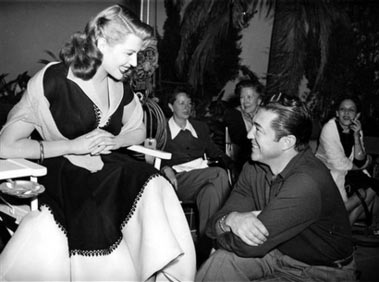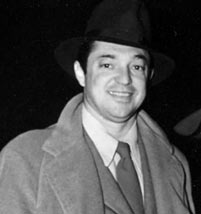Vincent Sherman, who directed, and romanced, Bette Davis, Rita Hayworth and
Joan Crawford during his heyday as a leading Hollywood filmmaker in the 1940s
and '50s, has died. He would have been 100 on July 16.

Actress
Rita Hayworth chats with director Vincent Sherman, right, between takes of
the movie 'Affair In Trinidad' in Hollywood, in this March 1952 file
photo. Sherman, who directed Bette Davis, Rita Hayworth and Joan Crawford
during his heyday as a leading Hollywood filmmaker in the 1940s and '50s,
has died. He would have been 100 on July 16, 2006. [AP
Photo] |
His death Sunday night of natural causes at the Motion Picture and Television
Hospital was announced Monday by his son, Eric Sherman.
"Vince was in good condition until two months ago," said actress Francine
York, his companion for the last nine years. "In January he had appeared on a
documentary about Humphrey Bogart, and he told a lot of good stories. He was the
last of the gentlemen, a real Southern gentleman."
Sherman was a successful director of such television series as "The Waltons,"
"Doctors Hospital," "Baretta," "Trapper John, M.D." and "77 Sunset Strip."
He had begun as an actor, appearing on Broadway and in a handful of movies,
among them 1933's "Counselor at Law," in which he had a small but memorable role
as a young anarchist opposite John Barrymore. He also wrote several screenplays,
including "Crime School," which starred Bogart and the Dead End Kids.
Because of his ability to evoke powerful performances from strong-willed
female stars, he also directed Ida Lupino, Ann Sheridan and Patricia Neal,
Sherman became known as a woman's director, a title he hated. He was quick to
point out that he also directed Errol Flynn in "The Adventures of Don Juan,"
Paul Newman in "The Young Philadelphians," Bogart in "All Through the Night,"
Richard Burton in "The Ice Palace" and Ronald Reagan in "The Hasty Heart."
Sherman also gained a reputation for romancing many of his famous actresses,
and he wrote about them in his 1996 autobiography, "Studio Affairs."
Though both were married at the time, he and Davis had an affair that began
during the filming of 1943's "Old Acquaintance" and continued through "Mr.
Skeffington," which was released the following year. His dalliance with Crawford
lasted through three movies, and another with Hayworth happened during "Affair
in Trinidad," after she had divorced Aly Khan.
Sherman's wife, Hedda, tolerated his extramarital adventures, and their
marriage lasted 53 years. She died in 1984.
During the early 1950s, his thriving career foundered as he was dropped
without explanation by Warner Bros. A federal agent had told the studio Sherman
was suspected of communist ties.
"I wasn't a communist," he remarked in 1997, "but I knew people like John
Garfield who'd been blacklisted, and I stood beside them."
Other studios shunned him, and he was caught in "a Kafkaesque situation."
After five years, he became employable again but never recovered his knack
for skillful melodrama. His last major feature was a lame western comedy, "The
Second Time Around," with Debbie Reynolds and Andy Griffith in 1961.

In this undated handout photo released by
Warner Bros., Vincent Sherman arrives in New York in March 1944. Sherman,
who directed, Bette Davis, Rita Hayworth and Joan Crawford during his
heyday as a leading Hollywood filmmaker in the 1940s and '50s, has died.
He would have been 100 on July 16, 2006. [AP
Photo] |
"My strong points were my relationships
with actors; I got good performances from people," he said in a 1997 interview.
"My weak points were in accepting assignments when I should have said no."
Turning to television, he worked well into the 1980s.
Born Abram Orovitz to one of the only two Jewish families in Vienna, Ga., in
1906, Sherman learned at an early age to defend himself against the taunts of
his schoolmates.
After graduating from Oglethorpe University, he sought an acting career in
New York, joining the left-wing Group Theater. Since ethnic names for actors
were unfashionable, he changed his to Vincent Sherman. Squarely built with black
hair and a ruggedly handsome face, he quickly began appearing on Broadway.
In the late 1940s Warner Bros. hired Sherman under an
acting-writing-directing contract, and he was assigned to the studio's B-picture
unit, adapting old movies into remakes.
He broke out as a director in 1942 with a gripping melodrama "The Hard Way."
Although he would go on to direct many important projects, he never rose to
the level that would afford him consideration for an Academy Award.
"Of the 30 pictures that I made, I really liked only 10 or 12 of them," he
said in 1997. "The rest were what we called bread-and-butter pictures."
Besides his son, Sherman is survived by a daughter, four grandchildren and
three great-grandchildren.